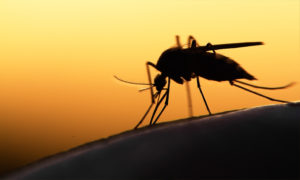 (Lindenwold, NJ) – Early Friday morning the Mosquito Control Commission will be in the community spraying and surveilling areas throughout Camden County. During the summer and fall months the commission schedules on an as-needed basis based upon the results of their surveillance efforts and input from the public.
(Lindenwold, NJ) – Early Friday morning the Mosquito Control Commission will be in the community spraying and surveilling areas throughout Camden County. During the summer and fall months the commission schedules on an as-needed basis based upon the results of their surveillance efforts and input from the public.
“Although it has been dry so far this week, we are forecasted to receive a considerable amount of precipitation over the next 72 hours, beginning with storms this afternoon and continuing into the weekend,” said Commissioner Jeff Nash, liaison to the Camden County Mosquito Commission. “Mosquitos need standing water to breed, so the first thing you should do after any rain is check your yard and remove any standing water to help eliminate the threat. This simple act can help reduce the pest population in your neighborhood and assist the efforts of the Camden County Mosquito Control Commission.”
Camden County Mosquito Commission will be conducting ULV “spraying” operations on Friday, July 2, between the hours of 2am-6am in the following locations, weather permitting:
Gibbsboro
Alden Rd.
Haddon Ave.
Clearbrook Dr.
Hawthorne Rd.
Washington St.
Kirkwood Rd.
Farwood Rd.
Kingsbridge Rd.
Winding Way
Edgehill Rd.
Woodbridge Rd.
Chatham Rd.
Wexford Ed.
Ridgewood Rd.
Lauer Ln.
Lambert Ln.
Windsor Rd.
Woodhaven Rd.
Nicholson Rd.
Cedarcroft Rd.
Winslow Twp.
Tupelo Ln.
Tupelo Ct.
Sassafras Dr.
Sassafras Ct.
Thousand Oak Dr.
Hemlock Ln.
Conifer Way
Conifer Ct.
Waterford
Chew Rd.
Victoria Ln.
Condo Ave.
Middle Ave.
Arrowhead Dr.
Brookfield Ln.
Sylvia Ln.
Conrad Ave.
Station Ln.
Pestleton Rd.
Autumn Crest Dr.
Pilgrim Way
Hunters Ln.
Harvest Ln.
Curry Ave.
De Pasquale Estate Dr.
Camden
Wiggins Park
Waterfront
Delaware Ave.
Clinton St.
Riverside Dr.
Market St.
“The commission works with the Public Health Environmental Laboratories in Trenton to verify the presence of West Nile Virus and other communicable diseases in their samples,” Nash said. “If a pool tests positive, the Mosquito Commission returns to spray the area. The sprayings take place when the mosquitoes are most active.”
The mosquito spray is not harmful to humans or pets, but you should avoid direct contact if you have respiratory concerns or are sensitive to irritants.
Residents should check their property for any object that holds water for more than a few days. All pre-adult mosquito stages (eggs, larvae, and pupae) must be in stagnant water in order to develop into adult mosquitoes.
- Swimming pools are a common problem. All pools must be checked and maintained to keep them mosquito-free. Swimming pools can breed mosquitoes within days after you stop adding chlorine or other disinfectant. Pool covers can catch rainwater and become a mosquito development site. Add a little chlorine to kill mosquitoes.
- Maintain screens to prevent adult mosquitoes from entering your home or business.
- Personal protection is strongly urged if you are outside when mosquitoes may be active—generally dawn and dusk. Insect repellants containing between 10-35% DEET are very effective, however, be sure to follow the label directions and take extra precautions with children and infants.
The Camden County Mosquito Commission suggests checking around your yard for mosquito breeding containers. The following is a checklist of tips to help eliminate mosquito breeding:
- Dispose of unnecessary containers that hold water. Containers you wish to save turn upside down or put holes in the bottom, so all water drains out.
- Lift up flowerpots and dump the water from the dish underneath every week.
- Stock fish or add mosquito larvicide to ornamental ponds.
- Change water in bird baths, fountains, and animal troughs weekly.
- Screen vents to septic and other water tanks.
- Store large boats so they drain and small boats upside down. If covered, keep the tarp tight so water does not pool on top of the tarp.
- Do not dump leaves or grass clippings into a catch basin or streams.
- Do not allow water to collect on sagging tarps or awnings.
- Do not allow trashcan lids to fill with water.
- Check downspouts that are able to hold enough water to allow mosquito larvae to mature.
For more information, or to report a problem, contact the Camden County Mosquito Commission at (856) 566-2945 or skeeters@camdencounty.com.
